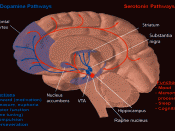Eating Disorders Humans have various physiological needs in life in order to survive: oxygen, water, constant body temperature and food (Simons). What happens if a human wants to eliminate one of these needs from their life, and why would a human want to eliminate it? Food, being one of the fundamental, physiological necessities in life, carries out various functions in the human body. Carbohydrates, proteins and lipids provide energy for our body to perform daily activities such as walking, cleaning, bathing and even thinking. When these different foods are taken away from one's life, severe consequences are likely to occur; organs will shut down and the body will stop functioning, and the result of the lack of food and nutrition will ultimately cause death.
Food can either be taken away from a person through force from another person, or a person can restrict themselves from the nutrition that food provides them.
The ladder of the two is performed in order to gratify a psychological need, not a physical need (Palme). Two eating disorders that are seen most today are anorexia nervosa and bulimia nervosa.
Anorexia nervosa is an often chronic eating disorder of which one ignores hunger and controls their desire to eat. It is also defined by not maintaining a minimal body weight within fifteen percent of the individual's normal body weight (Wolfe). Bulimia nervosa is a life-threatening eating disorder of which an individual goes through episodes of bingeing and purging. A large quantity of food is consumed in a short period of time, and the individual then attempts to free themselves of the calories by inappropriate, purging methods (Mayo Clinic Staff). Both eating disorders have features including excessive exercise and a distorted body image (Wolfe).
We now know what happens when food is taken away from a person,


